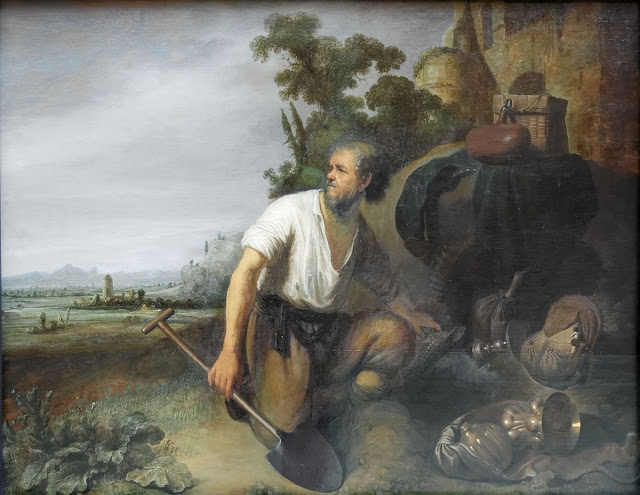Do we need grace to be saved?
In a world where human effort often leads to success, it may be tempting to believe that eternal life can be achieved through our own endeavors. Just as we might work diligently to lift ourselves out of poverty, one might assume that eternal salvation can be earned through human effort alone. However, the teachings of the Church, the writings of saints, and Holy Scripture reveal a profound truth: eternal life is a divine gift that cannot be merited by human effort alone. Just as we cannot cure ourselves of disease without the guidance of a physician (Sirach 38:1-15), we cannot attain eternal life without cooperating with God's grace. This essay explores the nature of grace and its essential role in meriting eternal life, affirming that it is only through God’s grace that we can hope to achieve salvation.
First, the necessity of grace is deeply rooted in the teachings of Thomas Aquinas, who asserted that “the free gift of God is eternal life” (Romans 6:23). Eternal life transcends human nature, both in terms of goodness and in our knowledge and desire. Aquinas elaborates that human nature, without grace, is incapable of meriting eternal life[1]. Our nature exists in two states: the original state before sin, as exemplified by Adam and Eve, and the corrupt state after the fall, before being restored by grace. In both conditions, it is evident that divine intervention is essential. In our original state, merit depends on divine agency[2]. As Saint Irenaeus reminds us, “The glory of God is man fully alive, and the life of man is the vision of God”[3].
Second, In our corrupted state, as emphasized by Saint Paul, “For by grace you have been saved through faith, and this is not from you; it is the gift of God” (Ephesians 2:8). Sin restricts our potency, and without divine forgiveness, man’s merit remains death (Romans 6:23). Saint Augustine eloquently states, “God gives where He finds empty hands”[4]. Restoration requires a return to our original likeness to God, achievable only through grace[5]. Pope John Paul II reinforces this, stating, “It is precisely in this ‘marvelous exchange’ of the Incarnation and Redemption that the grace which sanctifies us and justifies (meaning make us to be right not only ignoring our offenses) us comes into play”[6].
Third, consider the analogy of physical health: while one might work hard to avoid poverty, curing oneself of a disease requires the intervention of a physician. We must cooperate with the doctor’s instructions to restore health. Similarly, we cannot achieve eternal life through effort alone but must cooperate with God, the Divine Physician, obeying His commandments and accepting His grace. The Scriptures counsel us to heed the wisdom of our healers: “Honor the physician with the honor due him, according to your need of him, for the Lord created him” (Sirach 38:1). Likewise, we are reminded that “in Him we live and move and have our being” (Acts 17:28) and that it is God who works in us: “You have accomplished all we have done” (Isaiah 26:12).
Fourth, God alone is good, and it is through His goodness that we receive grace (Mark 10:18). When God calls us to act, He invites us to participate in His mission, yet it is His grace that empowers our actions. “For it is God who works in you to will and to act in order to fulfill his good purpose” (Philippians 2:13). The Scriptures emphasize the importance of acting in alignment with divine grace: “For we are God’s handiwork, created in Christ Jesus to do good works, which God prepared in advance for us to do” (Ephesians 2:10).
In conclusion, just as we rely on a physician to cure physical illness, we must rely on God’s grace to attain eternal life. Human effort/love alone is insufficient to merit salvation; it is through cooperation with divine grace and love that we find health, happiness, and holiness. If we are to be perfected in love, we must be learning in action what true love is so that we may know Him and His ways now to foster true communion with Him both now and in the life to come whence we become sheep rather than goats (Matthew 25:31-46; Revelation 21:27). It also makes sense that God would allow us to finish our perfection.[7] Eternal life is a gift, freely given by God, and it is through His grace that we are made worthy (actively and not only passively justified) to receive it. This profound truth, articulated by saints, the Magisterium, and Scripture, underscores the essential role of grace in our journey toward eternal life. As we strive to live in accordance with God’s will, let us remember that it is His grace that enables us to achieve the ultimate reward of eternal salvation.
Written by Carter Carruthers & also available soon at Missio Dei
FN:
- Thomas Aquinas, Summa Theologiae, I-II, q. 114, a. 2.
- Catechism of the Catholic Church, 1996-1998.
- Saint Irenaeus, Against Heresies, IV, 20, 7.
- Saint Augustine, Sermon 169.
- Catechism of the Catholic Church, 1999-2000, 2022.
- Pope John Paul II, Redemptor Hominis, 8.
- Read more scripture on this as needed



